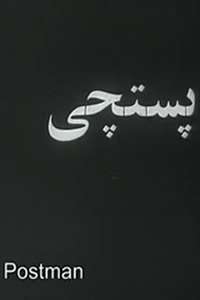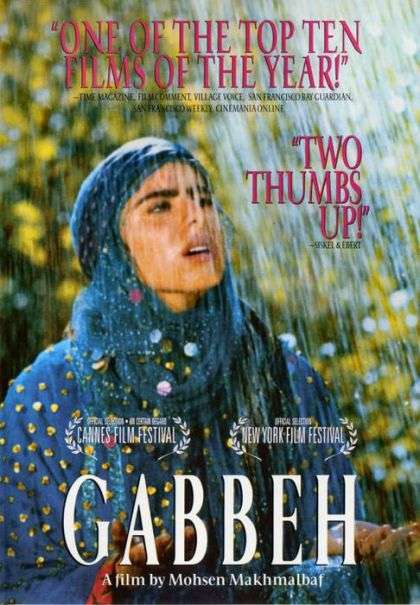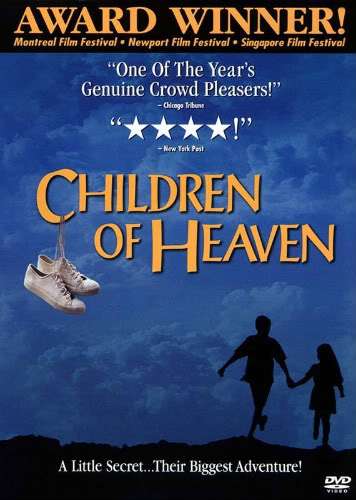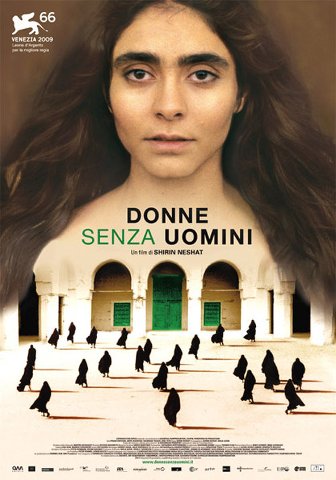Quote:
Gabbeh is a brilliantly colorful, profoundly romantic ode to beauty, nature, love and art. Mohsen Makhmalbaf originally traveled to the remote steppes of southeastern Iran to document the lives of an almost extinct tribe of nomads. For centuries, these wandering families created special carpets – Gabbeh – that served both as artistic expression and autobiographical record of the lives of the weavers. Spellbound by the exotic countryside, and by the tales behind the Gabbehs, Makhmalbaf’s intended documentary evolved into a fictional love story which uses a gabbeh as a magic story – telling device weaving past and present’ fantasy and reality.
On the banks of a stream, an old woman and her husband are washing their Gabbeh. From this carpet comes forth a beautiful young woman – aptly named Gabbeh – who shares her epic tale: she is desperately in love with a mysterious horseman who follows her clan from after. Though her father has agreed to let her marry the man, season after season, the horseman follows Gabbeh—always present, always waiting, howling songs of love after nightfall.
Delicately interlaced with this simple and touching love story are the people whose lives are shaped by the rhythms of nature, and who instinctively express the joys and sorrows of life through song, poetry, and the tales they tell in their brilliantly-hued weavings.Read More »
Iran
-
Mohsen Makhmalbaf – Gabbeh (1996)
1981-1990ArthouseFantasyIranMohsen Makhmalbaf -
Majid Majidi – Bacheha-Ye aseman AKA Children Of Heaven (1997)
1981-1990ArthouseDramaIranMajid MajidiMovie Review
The Children of Heaven (1997)
FILM REVIEW; For a Pair of Sneakers, Longing, Lies and a Plan
By JANET MASLINThe young hero of Majid Majidi’s ”Children of Heaven” is played by Mir Farrokh Hashemian, a desolate-looking boy with huge brown eyes and a way of sending tears suddenly rolling down his cheeks. Those tears well up with some regularity during this film about 9-year-old Ali, his younger sister Zahra (Bahareh Seddiqui) and their scheme for sharing a pair of his tattered sneakers. The children want to hide the fact that Zahra’s shoes have been lost because this will be a hardship for their parents. The family’s carefully detailed poverty, which reflects the filmmaker’s own childhood experience, colors everything that happens in this story.
Events in the film are seen through the children’s ingenuous eyes, as is so often and artfully the case in Iranian films. (A child’s-eye view is, among other things, helpful in circumventing Government censors.) But in the more honest, less manipulative films that this one resembles — especially the graceful work of Jafar Panahi (”The White Balloon,” ”The Mirror”) — what the young characters observe is liable to be more surprising than it is here. In ”Children of Heaven,” life is sweet despite countless hardships, and no reality beyond the economic intrudes upon a fairy tale atmosphere. Only through heavy-handed emphasis does the quest for new sneakers take on any greater meaning.Read More »
-
Kamran Shirdel – An shab ke barun amad AKA The Night it Rained (1967)
1961-1970ArthouseDocumentaryIranKamran ShirdelAlso known as The Epic Of Gorgan Village Boy, is a modern-day epic that attempts to retrace the true circumstances of a heroic act in the north-Iranian countryside. One rainy night near the village of Gorgan, a schoolboy discovered that the heavy rains had washed away the soil underneath a section of railroad tracks. He proceeded to stop an oncoming train by lighting his coat on fire, standing on the tracks and waving it. Doing so, the schoolboy prevented a terrible railroad accident. Incorporating newspaper reports and interviews with railroad employees, the governor, the chief of police, the village teacher, students and villagers, Shirdel describes the events, or better, the divergent recollections of them. The skilfully and cyclically edited footage is riddled with contradictions. How could this young hero have set fire to his coat in the pouring rain? Did he even exist? According to one toothless old man, “It’s all just a pack of lies.”Read More »
-
Shirin Neshat & Shoja Azari – Zanan-e bedun-e mardan AKA Women Without Men (2009) (HD)
2001-2010ArthouseDramaIranShirin Neshat and Shoja AzariAgainst the tumultuous backdrop of Iran’s 1953 CIA-backed coup d’état, the destinies of four women converge in a beautiful orchard garden, where they find independence, solace and companionship. (IMDb)
*
WOMEN WITHOUT MEN, an adaptation of Shahrnush Parsipur’s magic realist novel, is acclaimed Iranian artist, Shirin Neshat’s, first feature length film.
It is an incisive and sumptuously filmed reflection on the pivotal moment in history that directly led to the Islamic revolution and the Iran we know today.
The story chronicles the intertwining lives of four Iranian women during the summer of 1953; a cataclysmic moment in Iranian history when an American led, British backed coup d’état brought down the democratically elected Prime Minister, Mohammad Mossadegh, and reinstalled the Shah to power.
Over the course of several days four disparate women from Iranian society are brought together against the backdrop of political and social turmoil. Fakhri, a middle aged woman trapped in a loveless marriage must contend with her feelings for an old flame who has just returned from America and walked back into her life. Zarin, a young prostitute, tries to escape the devastating realization that she can no longer see the faces of men. Munis, a politically awakened young woman, must resist the seclusion imposed on her by her religiously traditional brother, while her friend Faezeh remains oblivious to the turmoil in the streets and longs only to marry Munis’ domineering brother.
Read More » -
Bahram Beizai – Tcherike-ye Tara AKA Ballad of Tara (1979)
1961-1970ArthouseBahram BeizaiIranPlot:
Tara, the young beautiful widow, returns with her two little kids from country to her village. In her way home, she finds out that her grandfather has passed away. She distributes grandpa’s belongings among her neighbours. But there remains an old sword that no one accepts it. One day on the road, she meets an old-time warrior. He claims that his clan have sent him to present time to take the old sword back. Tara finally submits the sword to him, but he comes back saying that he has fallen in her love.Read More » -
Forugh Farrokhzad – The House is Black aka Khaneh siah ast (1963)
1961-1970Amos Vogel: Film as a Subversive ArtDocumentaryForugh FarrokhzadIranShort FilmFrom Village Voice: In 1962, beloved and controversial poetess Forugh Farrokhzad went to Azerbaijan and made this short film on the grounds of a leper colony, presaging in 22 minutes the entirety of the Iranian new wave and the international quasi-genre of “poetic nonfiction.” It’s a blackjack of a movie, soberly documenting the village of lost ones with an astringently ethical eye, freely orchestrating scenes and simply capturing others, while on the soundtrack Farrokhzad reads her own poetry in a plaintive murmur—this in the same year as Vivre sa Vie and La Jetée. (Chris Marker has long been a passionate fan, as has Abbas Kiarostami, whose The Wind Will Carry Us owes its title and climactic verse to Farrokhzad.) It was the only substantial piece of cinema Farrokhzad ever made. Five years later, having already attained near legendary status in Iran for her writing, she was killed in a car crash at the age of 32, guaranteeing her posthumous fame as a feminist touchstone for generations of angry Persian women.Read More »
-
Jafar Panahi – Offside (2006)
2001-2010ComedyDramaIranJafar PanahiSince women are banned from soccer matches, Iranian females masquerade as males so they can slip into Tehran’s stadium to see the game between Iran and Bahrain. The ones who are caught and arrested are taken to a holding area and guarded by soldiers. One sympathetic soldier agrees to watch the game through a peephole and recount the action to the impatient fans.Read More »
-
Manijeh Hekmat – Zendan-e zanan aka Women’s Prison (2002)
Drama2001-2010IranManijeh Hekmat
Spanning 18 years in an Iranian women’s prison, this follows two women: the new prison warden, a tough as nails devout Muslim who has served in the army on the Iraqi front, and a young midwife, Mitra, who is serving her sentence for killing her mother’s abusive husband. In the early years, Mitra is repeatedly punished as the warden tries to break her. This includes punishment for delivering a baby in the prison cell while all of the prison staff has taken shelter during an Iraqi bombing. The warden’s attitude starts to change after 8 years, when Mitra tries to protect a new inmate from rape at the hands of her older cellmates. When the baby comes back in 1991 as a 17 year old delinquent, Sepideh, the warden respects Mitra enough to protect the girl.Read More »
-
Dariush Mehrjui – Postchi AKA The Postman (1972)
1971-1980ArthouseDariush MehrjuiDramaIran
This film firnly establishes as a major talent the Iranian
Mehrjui, whose successful fusing of pathos, humor, and pre-
occupation with the poor resembles nothing less than Chaplin
or early De Sica in its ferocity. In his earlier The Cow, the
only owner of such a precious animal in a poverty-stricken
village goes insane over its loss and assumes its place;
berserk, he is put into a harness, is dragged off to a
nearby hospital, beaten like an animal, and finally
dies the death of a beast in a mudhole. The Mailman
is an unforgettable Wozzeck-like figure, the eternal
simple-minded victim who finally rises to mistaken
grandeur in a murderous gesture that leaves him
braying with despair over the body of his victim.
Since such films can never be popular, they are living
proof of the fact that box-office returns must not
be allowed to determine the life of a work of art.Read More »







